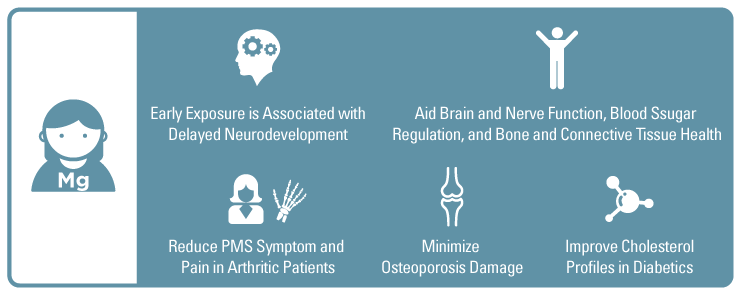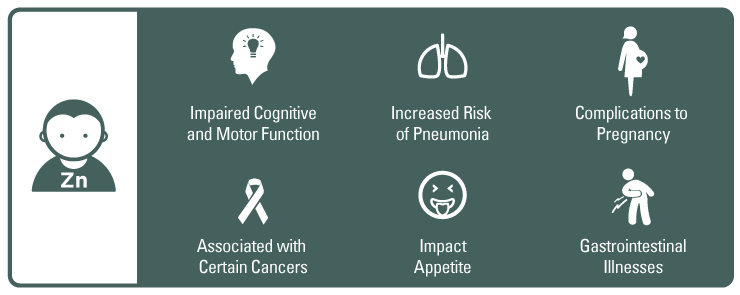TellSpec Top 5: The metals in your food
Last week we introduced Top 5 Metals in Your Food. Here is another group of 5 metals for your curiosity.
 6. Manganese is essential to human health and plays many roles, including aiding brain and nerve function, blood sugar regulation, and bone and connective tissue health. Manganese poisoning is uncommon outside of industries that deal directly with it, though early exposure is associated with delayed neurodevelopment. Manganese deficiency, however, is estimated to occur in up to 37% of Americans, particularly those with refined-grain-based diets, as it is found in whole grains, nuts, and seeds. Manganese may help minimize osteoporosis damage when taken with other essential elements; may reduce PMS symptoms; may improve cholesterol profiles in diabetics; and may help reduce pain in arthritic patients.
6. Manganese is essential to human health and plays many roles, including aiding brain and nerve function, blood sugar regulation, and bone and connective tissue health. Manganese poisoning is uncommon outside of industries that deal directly with it, though early exposure is associated with delayed neurodevelopment. Manganese deficiency, however, is estimated to occur in up to 37% of Americans, particularly those with refined-grain-based diets, as it is found in whole grains, nuts, and seeds. Manganese may help minimize osteoporosis damage when taken with other essential elements; may reduce PMS symptoms; may improve cholesterol profiles in diabetics; and may help reduce pain in arthritic patients.
References: University of Maryland Medical Center / Food Standards Agency
 7. Mercury is most commonly discussed regarding methylmercury content in seafood. Methylmercury will accumulate within the protein of fish and shellfish and is not destroyed by cooking; other sources include rice grown in mercury-contaminated areas and sometimes organ meats. As methylmercury accumulates up the food chain, choosing smaller fish lower on the food chain like sardines, not only larger predatory fish like tuna, can help control intake. Some studies have also found mercury in high fructose corn syrup. Methylmercury intake is associated with cardiovascular disorders; possible effects on male fetuses during pregnancy; and neurological disorders and delayed development, notably in children whose mothers’ diet had higher mercury levels.
7. Mercury is most commonly discussed regarding methylmercury content in seafood. Methylmercury will accumulate within the protein of fish and shellfish and is not destroyed by cooking; other sources include rice grown in mercury-contaminated areas and sometimes organ meats. As methylmercury accumulates up the food chain, choosing smaller fish lower on the food chain like sardines, not only larger predatory fish like tuna, can help control intake. Some studies have also found mercury in high fructose corn syrup. Methylmercury intake is associated with cardiovascular disorders; possible effects on male fetuses during pregnancy; and neurological disorders and delayed development, notably in children whose mothers’ diet had higher mercury levels.
References: BioOne / International Journal of Environmental Research and Public Health / European Commission 1 / European Commission 2
 8. Selenium is essential to human health and typically intake is within the healthy range. However, exceeding the maximum recommended intake can lead to symptoms within days. These symptoms include hair and nail loss, skin lesions, digestive issues, and effects on the nervous system. Fish, shellfish, and animal meats can provide the recommended daily intake within one to two servings; multiple servings over the day can get the intake up into the danger zone, particularly when combined with supplements such as multivitamins. Perhaps the biggest risk is brazil nuts, an ounce of which can contain over 700% of the recommended daily intake—well above the maximum intake value. So stick to nuts like almonds for your afternoon snack.
8. Selenium is essential to human health and typically intake is within the healthy range. However, exceeding the maximum recommended intake can lead to symptoms within days. These symptoms include hair and nail loss, skin lesions, digestive issues, and effects on the nervous system. Fish, shellfish, and animal meats can provide the recommended daily intake within one to two servings; multiple servings over the day can get the intake up into the danger zone, particularly when combined with supplements such as multivitamins. Perhaps the biggest risk is brazil nuts, an ounce of which can contain over 700% of the recommended daily intake—well above the maximum intake value. So stick to nuts like almonds for your afternoon snack.
References: ScienceDirect 1 / ScienceDirect 2 / De Gruyter / ScienceDirect / Nutrition Data / Live Science
 9. Tin is nonessential to life and fortunately is not highly absorbed by the body. High levels of tin intake can cause nausea, vomiting, and diarrhea. The most likely source of tin in the diet is unlacquered tin cans and possibly tin-containing cooking implements. Tin leaching from tin cans is most common if acidic foods are stored in them; buying tomato products, fruits, pickles, and similar items in glass containers reduces this risk. Tin-containing-compounds known as organotin compounds have been used industrially and agriculturally, and therefore may exist in water runoff and marine life.
9. Tin is nonessential to life and fortunately is not highly absorbed by the body. High levels of tin intake can cause nausea, vomiting, and diarrhea. The most likely source of tin in the diet is unlacquered tin cans and possibly tin-containing cooking implements. Tin leaching from tin cans is most common if acidic foods are stored in them; buying tomato products, fruits, pickles, and similar items in glass containers reduces this risk. Tin-containing-compounds known as organotin compounds have been used industrially and agriculturally, and therefore may exist in water runoff and marine life.
References: Wiley Online Library / ScienceDirect
 10. Zinc is essential to a healthy body and deficiency is more common than excess consumption. Zinc deficiency can cause impaired cognitive and motor function, is associated with certain cancers, increased risk of pneumonia, complications to pregnancy, and can impact appetite. Risk of zinc deficiency increases with gastrointestinal illnesses causing malabsorption, diabetes, and bariatric surgeries. Food sources of zinc include oysters, shellfish, meat, legumes, and nuts (notably cashews and almonds.)
10. Zinc is essential to a healthy body and deficiency is more common than excess consumption. Zinc deficiency can cause impaired cognitive and motor function, is associated with certain cancers, increased risk of pneumonia, complications to pregnancy, and can impact appetite. Risk of zinc deficiency increases with gastrointestinal illnesses causing malabsorption, diabetes, and bariatric surgeries. Food sources of zinc include oysters, shellfish, meat, legumes, and nuts (notably cashews and almonds.)
References: NCBI / National Institutes of Health / Food Navigator / Food Standards Agency / Healthy Eating




Leave a Reply
Want to join the discussion?Feel free to contribute!